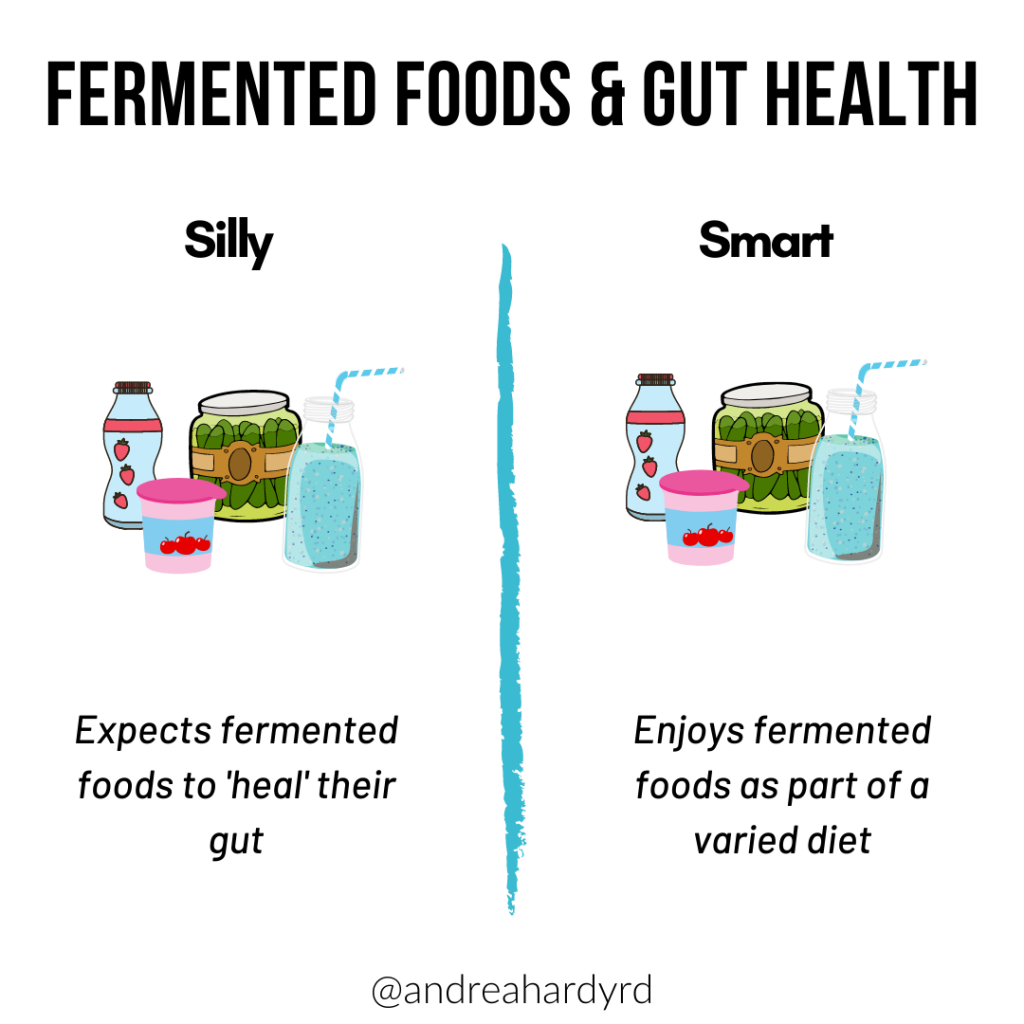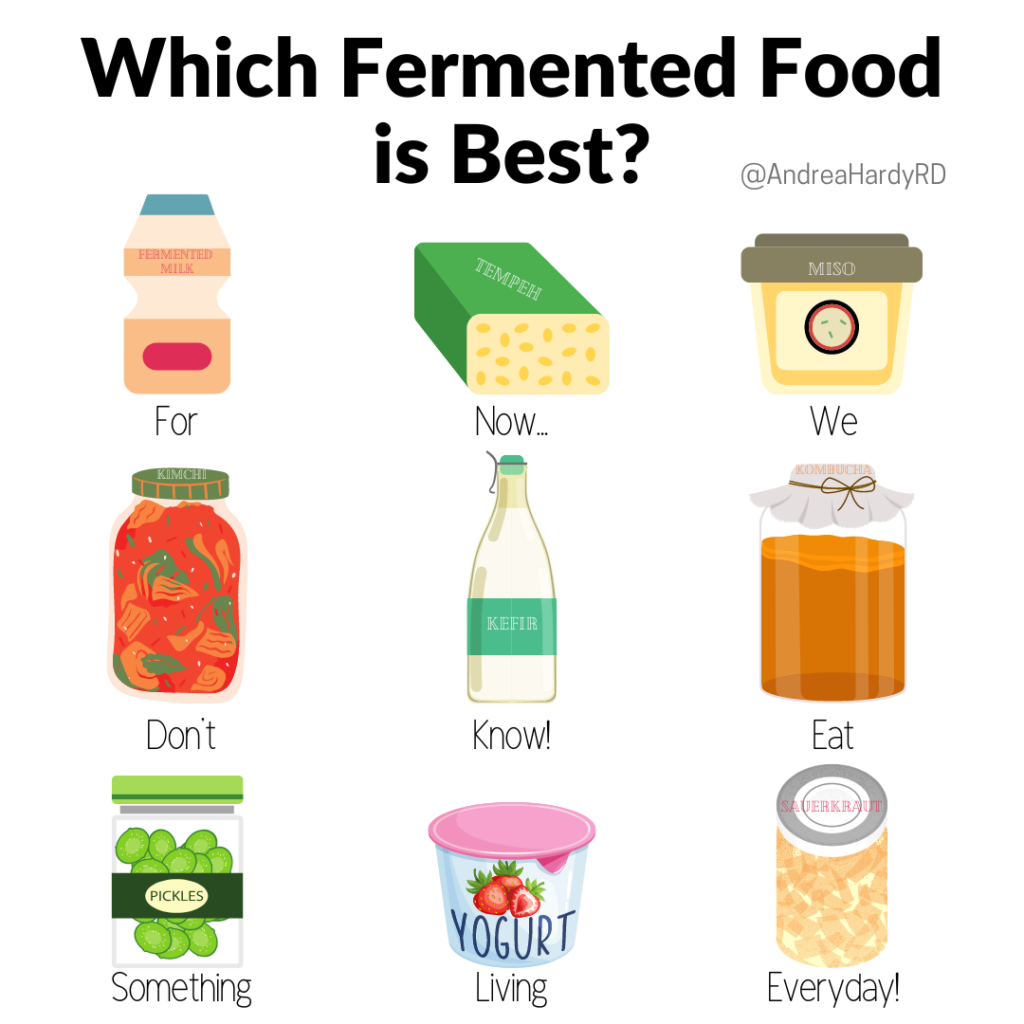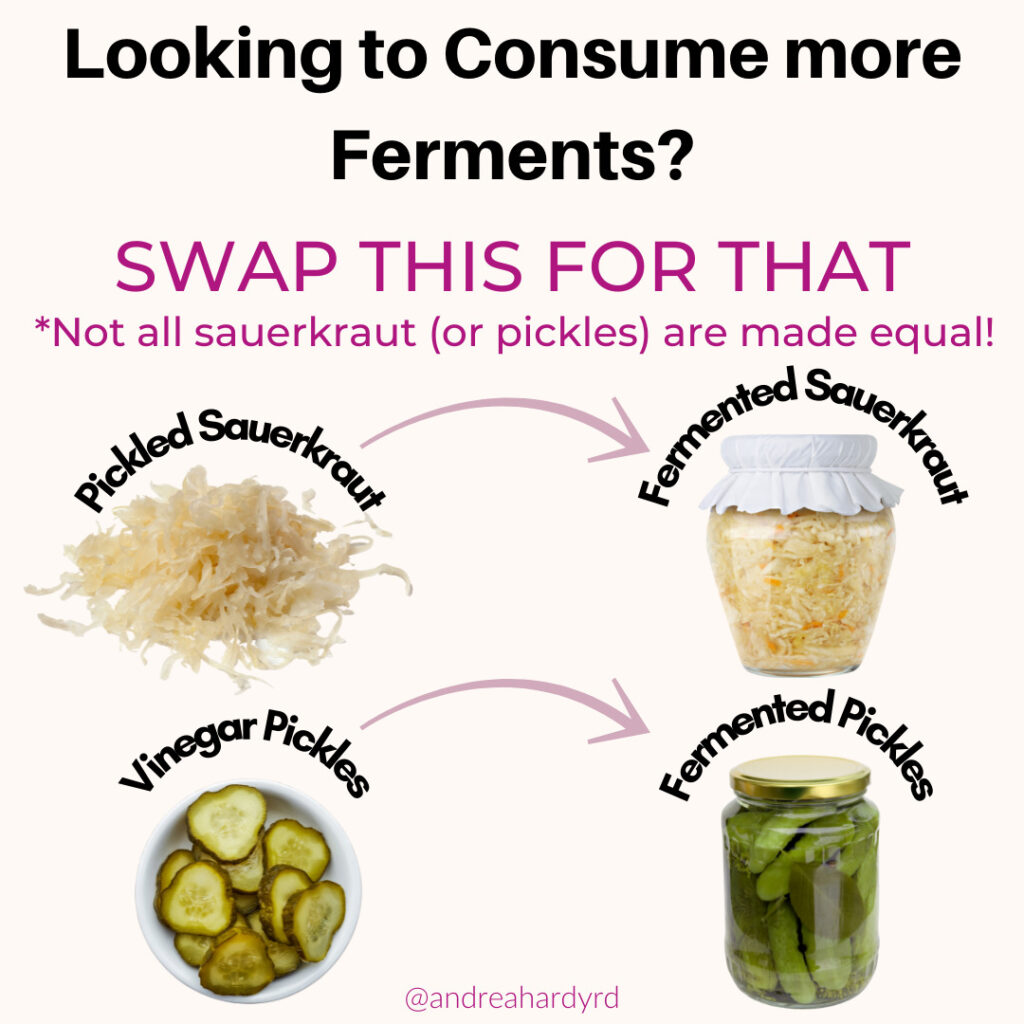Are fermented foods beneficial for our gut microbiome? As a gut health dietitian I want to talk all about gut health and fermented foods. Is eating fermented foods the same as taking a probiotic supplement?
The amount of misinformation I see about fermented foods is astounding.
Myths About Fermented Foods
- Not all fermented foods are ‘probiotics’. Probiotics MUST have strains of specific bacteria, that when administered in adequate amounts, provide a proven health benefit. Examples would be some (but not all!) yogurt and kefir.
- Fermented foods don’t ‘heal your gut’. In fact! Some of my IBS patients drink kombucha by the gallon. As well as eat a ton of sauerkraut – not realizing that these foods can actually exacerbate their symptoms!
Fact About Fermented Foods
- Fermented foods are delicious. They’re a fun way to add variety to the diet.
- Some fermented foods contain compounds called ‘metabolites’, which are produced the bacteria or yeast breaking down the foods. These include lactic acid, vitamins, and exopolysaccarides, which likely have health benefits for us. Interestingly, some studies have found that these by-products may play a role in immune regulation. As well as chronic disease risk & prevention too! Bottom Line: We need more research.
- Fermented foods can improve digestibility of foods. This is especially true if you’re lactose intolerant! Kefir and yogurt are inherently lower in lactose, because the bacteria has metabolized the carbohydrate.
- Some fermented foods qualify as probiotic and may have additional benefits!
FERMENTED FOODS IMPACT ON THE GUT MICROBIOTA
A recent large scale study compared consumers of fermented plant foods microbiota with those that were non-consumers. The difference in the gut microbiome profiles were only slightly different, with bacterial diversity being no different. I can’t say this is much of a surprise. As we know, it’s unlikely the bacteria in fermented foods actually populate the gut. While the results are understandably disappointing, the research in this area is in its infancy. Really, and we can expect more down the road!
KEY TAKEAWAYS
- Fermented foods add variety to our diets. Additionally, their metabolic byproducts may infer a health benefit, but more research is needed
- I still like to enjoy fermented foods every day! I eat a ton of yogurt, but like to splurge on ‘salsakraut’ – a salsa-style sauerkraut made in my community!
Which Fermented Food is Best?
Fermented foods are ALL the rage but do they do what we actually THINK they’re doing? 🦠
I’ve seen wild fermented food claims like:
– boost your immune system
– that they ‘heal your gut’
– prevent cancer?!
etc.
Sure, we have some research to support that SOME ferments have SOME possible benefits. (Most researched include yogurt and kefir) – However! SO many of the claims made are over stated, based on animals, cell cultures, or no research at all.
At this point, one ferment isn’t superior to the other. As we don’t have a ton of data or even good quality data.
So what should we take away from this?
Health Benefits of Fermented Foods
Enjoy ferments as you wish! I like to encourage intake for a variety of reasons. (None of the wild claims above, of course). Rather, because of all the small benefits we know exist including:
- Adding variety to your diet. Many ferments provide additional sources of nutrients like fibre, protein, calcium, and vitamin D
- Fermentation can often make foods easier to digest, ie. sourdough bread (lower fructans), yogurt & kefir (lower lactose)
- Increases the bioavailability of polyphenols and other bioactive compounds
- Some ferments can increase the production of vitamins, short chain fatty acids and other beneficial compounds
- Some microbes in ferments with living cultures (yogurt, kefir, etc.) have been shown to reach the colon. With the possibility of them exerting beneficial effects on our health & colonic microbiome
BOTTOM LINE:
Including them is awesome, definitely include the ones you like! No pressure to ‘force’ yourself to eat sauerkraut just for the microbes. (Which I have seen people think they need to do!) Let’s just be realistic about expectations 😉
Are all pickles/sauerkraut etc fermented? 🥒
No!
Pickled foods and fermented foods are NOT the same thing!
What is pickling?
Pickling (think jars at room temp on a shelf) is a method of food preservation. It involves soaking foods like cucumbers or cabbage in an acidic liquid like vinegar.
This produces the sour flavour we associate with pickles. It also involves the use of heat. Which kills any microorganisms that might have been present. Meaning – no microbes (good or bad!)
What is fermentation?
Fermentation on the other hand is a process where microbes create chemical reactions of food components. The microbes grow, and the food gets chemically modified in some way. (ie. sugars in cucumbers break down to carbon dioxide and organic acids like lactic and acetic acid, and even some alcohol!)
Fermentation serves to preserve the food and provide a desired flavour and texture.
The big difference? There is often be surviving microbes in your fermented pickles and sauerkraut!
So what’s the benefit of eating fermented foods?
Consuming foods with live microbes (like yogurt, kefir, kimchi and more) can be a great way to introduce live microbes into your digestive tract. While the benefits of eating these things haven’t fully been elucidated. (So many crazy claims online!) You can absolutely still enjoy them.
Looking to consume more fermented foods? Try switching your pickled dills and sauerkraut for traditionally fermented versions and give your gut bugs a boost!




Recent Comments